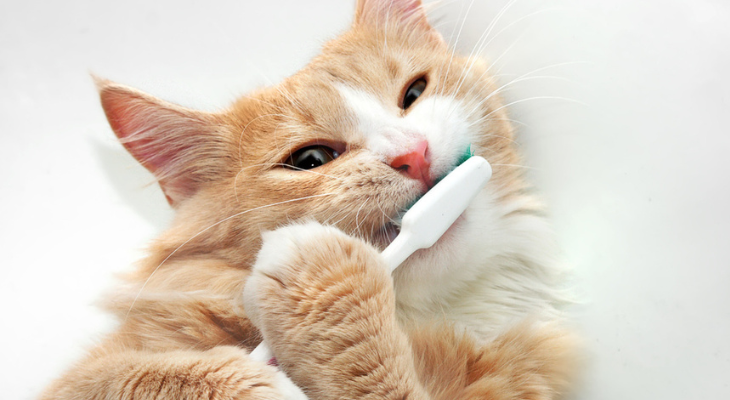
Bad Breath May Mean Your Pet Has a Dental Problem
Overwhelmed by your pet's bad breath? If you flinch every time your pet nuzzles against your face, it may be time to make an appointment with the veterinarian. Stinky breath can be a sign of a tooth or gum problem that requires prompt dental care.
Why Your Pet's Breath Smells Bad
Plaque and tartar build-up is a common cause of bad breath in people and pets. Clear, sticky plaque constantly coats your dog or cat's teeth with a layer of smelly bacteria. If plaque remains on the teeth for more than a few days, it turns into tartar, a hard brown or gray deposit that's visible on the teeth.
You'll usually see tartar between teeth and at the bottom of the teeth next to the gums. Plaque continues to form on top of the tartar, inflaming and irritating your pet's gums.
Tartar increases your pet's risk of developing periodontal (gum) disease. In addition to causing bad breath, the disease can lead to gum damage, infections, and tooth loss. Although any pet can suffer from gum disease, it's more common in smaller dogs with crooked or crowded teeth and may cause them to lose teeth prematurely. The American Kennel Club notes that toy breeds may only have half of their teeth by age 12 due to dental issues.
Bad breath may be a problem if a piece of food or a non-edible object become stuck between your pet's teeth. As the trapped food decays, you'll notice an unpleasant smell. Bacteria builds up on anything that becomes trapped between the teeth, whether it's food or a string from a toy.
Cancerous tumors in the mouth are another source of bad breath. Tissues in the tumor may become infected and die, causing unpleasant breath odor, according to PetMD.
Other causes of bad breath include:
- Eating Something Smelly
- Bacterial Imbalances Caused by Nutritional Deficiencies
- Liver, Respiratory or Kidney Disease
- Diabetes
- Mouth Injuries
Signs It's Time to See the Veterinarian
In addition to frequent bad breath, other signs of a dental issue, include:
- Yellow or Brownish Build-Up on Teeth
- Swollen, Red Gums
- Bleeding from the Mouth (You may see blood on food or on toys.)
- Chewing on One Side of the Mouth or Dropping Food When Chewing
- Lack of Interest in Eating
- Pawing at the Mouth
- Slow Chewing
- Drooling
- Weight Loss
Dental problems can be painful. Pets suffering from periodontal disease or other issues may not liked to be touched around the mouth.
A Visit to the Veterinarian Will Help Improve Your Pet's Dental Health
If plaque and tartar build-up are the problem, a thorough dental cleaning at the veterinary office will improve your cat or dog's breath. Pets usually receive anesthesia during cleanings, as they're often unwilling participants when it comes to dental work. Yearly cleanings are recommended for most pets, but some may need more frequent professional cleanings.
If your pet has periodontal disease, its gums may begin to pull away from the teeth, forming deep pockets around the teeth. Debris and bacteria collect in the pockets, which only worsens your pet's breath.
Dogs and cats with gum pockets will need a special deep dental cleaning to removes plaque, tartar, and bacteria above and below the gum line. Antibiotics may also be needed to treat bacterial infections. Although your veterinarian will do everything possible to save your pet's teeth, sometimes extraction (removal) is the only option if periodontal disease is severe.
Your pet may need surgery if a tumor is the reason for the bad breath. Tumors can benign (non-cancerous) or cancerous. If your pet has a cancerous tumor, radiation or chemotherapy may also be recommended, depending on the type and stage of the cancer.
How You Can Prevent Bad Breath
Cleaning your pet's teeth every day removes plaque and prevents bad breath. Start the process slowly by cleaning your furry friend's teeth with a moistened washcloth or piece of gauze.
You may only be able to clean a few teeth at a time at first. As your pet gets used to teeth cleaning, you may be able to clean more and more teeth in one sitting. Eventually, your pet may let you use a finger brush or pet-sized toothbrush with toothpaste. Use a rice-sized portion of pet toothpaste or gel whether you brush or wipe your cat or dog's teeth.
Concerned about your pet's bad breath? Call our office to schedule an appointment.
Sources:
American Kennel Club: Do Small Dogs Have More Dental Problems Than Large Dogs?, 7/13/2021
American Kennel Club: How to Get Rid of Stinky Dog Breath, 7/8/2021
